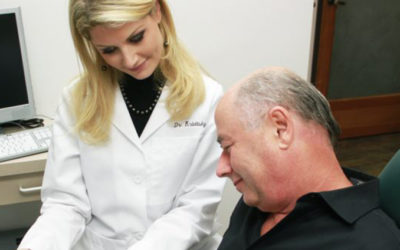Why Are My Gums Sore?
The above examples represent instances of acute gum soreness, which will usually heal in a few days or, at the most, a couple weeks. However many people suffer from chronic gum soreness as a result of periodontal disease. Also known as gum disease, this chronic condition is caused by a bacterial colonization known as plaque biofilm, which forms along and under the gum line. When plaque biofilm is not removed thoroughly through professional cleanings, brushing and flossing, it can lead to infections in the gums, bone, and other tissues that surround and support the teeth. The first stage of gum disease, called gingivitis, may include inflammation, gum soreness, redness, and bleeding. The good news about gingivitis is that it is usually reversible. Once the second stage of gum disease, periodontitis, is reached, treatment becomes more difficult.
If you are suffering from gum soreness that doesn’t improve after a few days, don’t hesitate to schedule a consultation with Dr. Aalam or Dr. Krivitsky to prevent a more serious periodontal condition from developing. You can also check out the following suggestions for preventing gum soreness in the future.
4 TIPS TO PREVENT SORE OR BLEEDING GUMS:
1. Follow a good home care routine.
Brush twice a day for two minutes and floss at least once a day, making sure to use the correct techniques. Brushing should be done with a manual or electric soft-bristled toothbrush while utilizing a gentle, circular motion. When flossing you should gently glide the floss down both sides of each tooth, being careful not to cut across the “V” shape of the gums. If you do not have the dexterity to floss, try using plastic or wooden dental picks or small interdental brushes. When you visit Dr. Aalam and Dr. Krivitsky at the Center for Advanced Periodontal & Implant Therapy, they can help customize a home care routine for your specific needs.
2. Get regular dental checkups and teeth cleanings.
Checkups at your general dentist should be done annually, and while cleanings are recommended every six months, people with gum disease may require additional attention. Your dentist may recommend more frequent cleanings if you have signs of gingivitis or periodontitis. If you have sore gums or think you may have gum disease, be sure to make an appointment with one of our board-certified periodontists in Brentwood.
3. Eat a healthy and well balanced diet.
They used to say, “Eat an apple a day,” and while apples are a healthy snack choice, you should also try to include in your diet plenty of leafy greens, root vegetables, protein, calcium, and fruits rich in vitamin C. Nutrition is a key factor in total body health, and that includes your mouth.
4. Cut out tobacco products and limit alcohol consumption.
Cigarette smoke and chewing tobacco, as well as abusive alcohol consumption, can cause red and irritated patches to form on the gums and throughout the mouth, and even more seriously, lead to oral cancer.
TREATMENTS FOR GUM DISEASE
If you do have gum disease, the treatments may include a more diligent home care regimen, deep cleanings, also known as scaling and root planing, and pocket reduction surgery for cases in which the underlying structures of the tissue and bone have been affected. It is important to choose a doctor with expertise in the field of periodontology. Dr. Aalam and Dr. Krivitsky are both board-certified periodontists as well as graduates of USC’s prestigious certificate program in Advanced Periodontology and Implantology.
MAKE AN APPOINTMENT WITH A PERIODONTAL EXPERT
Over 75% of American adults over the age of 35 suffer from some degree of gum disease. If you are concerned about your gum health, please contact the Center for Advanced Periodontal & Implant Therapy by calling 310-826-8242 or visit us online to make an appointment with one of the only two board-certified periodontists in Brentwood.
You May Also Like...
Understanding the Microbiome of the Mouth: Why Balance Matters for Gum Health
We often think of brushing, flossing, and regular cleanings as the cornerstones of oral health. But beneath these...
The Real Cure for Periodontitis: Dispelling Myths About Gum Disease Treatment
Periodontitis, commonly known as gum disease, has long been regarded as a chronic condition that can only be managed,...
Senior Periodontal Care and the Challenges Aging Presents
As we journey through the stages of life, there's one aspect that demands consistent consideration — our oral health....



